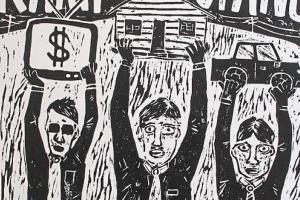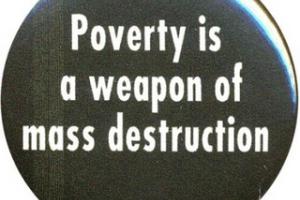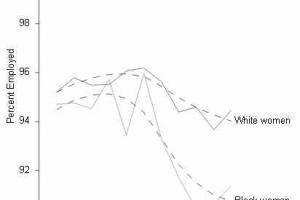The Zombie Robot Argument Lurches On
Economic Policy Institute
 Until recently, any proposal to "save" Europe was regarded sympathetically, albeit with skepticism about its feasibility. Today, the skepticism is about whether Europe is worth saving. The European idea is being driven into retreat by the combined force of a denial, an insurgency, and a fallacy. progressives need to ask a straightforward question: Why is the European idea dying? The answers are clear: involuntary unemployment and involuntary intra-EU migration.
Until recently, any proposal to "save" Europe was regarded sympathetically, albeit with skepticism about its feasibility. Today, the skepticism is about whether Europe is worth saving. The European idea is being driven into retreat by the combined force of a denial, an insurgency, and a fallacy. progressives need to ask a straightforward question: Why is the European idea dying? The answers are clear: involuntary unemployment and involuntary intra-EU migration.
 Honoring King's vision and legacy thus requires not simply remembering his most well-known dream: a racially inclusive society very different from the one that existed in his, or sadly, our own time. It requires recognizing the need to redistribute the power from the oppressive, exclusionary institutions, many of the same ones - housing, schools, criminal justice, the economy - he fought for until the day he was taken from us. What does honoring that vision mean today?
Honoring King's vision and legacy thus requires not simply remembering his most well-known dream: a racially inclusive society very different from the one that existed in his, or sadly, our own time. It requires recognizing the need to redistribute the power from the oppressive, exclusionary institutions, many of the same ones - housing, schools, criminal justice, the economy - he fought for until the day he was taken from us. What does honoring that vision mean today?
 Victor Grossman reports from Berlin on causes of the spate of violence striking Germany and across Europe. We need not look too far to find possible causes of such hatred or, frequently, of distorted despair. I think of what so many have gone through. War-torn home towns, shootings, explosions and bombings in their native Syria, Iraq, Afghanistan, a terrifying flight to get away, to find some haven, where they can escape and perhaps even realize their hopes and wishes.
Victor Grossman reports from Berlin on causes of the spate of violence striking Germany and across Europe. We need not look too far to find possible causes of such hatred or, frequently, of distorted despair. I think of what so many have gone through. War-torn home towns, shootings, explosions and bombings in their native Syria, Iraq, Afghanistan, a terrifying flight to get away, to find some haven, where they can escape and perhaps even realize their hopes and wishes.
 The renewed focus, particularly on the left, on precariousness constitutes a recognition of the harsh reality of capitalism, and particularly of today’s globalized monopoly-finance capital. More than a century of Marxian political-economic critique allows us to appreciate the extent to which the conditions that Marx described, focusing on a small corner of Europe in the mid-nineteenth century, are now global, and all the more perilous.
The renewed focus, particularly on the left, on precariousness constitutes a recognition of the harsh reality of capitalism, and particularly of today’s globalized monopoly-finance capital. More than a century of Marxian political-economic critique allows us to appreciate the extent to which the conditions that Marx described, focusing on a small corner of Europe in the mid-nineteenth century, are now global, and all the more perilous.
 If you’re a woman over the age of 50, finding work has statistically gotten harder since 2008. Economics correspondent Paul Solman sat down with Teresa Ghilarducci, a labor economist and the author of the new book, “How to Retire with Enough Money,”to talk about how age discrimination and assumptions about the worth of women’s labor affect the job and retirement prospects of “older” women workers.
If you’re a woman over the age of 50, finding work has statistically gotten harder since 2008. Economics correspondent Paul Solman sat down with Teresa Ghilarducci, a labor economist and the author of the new book, “How to Retire with Enough Money,”to talk about how age discrimination and assumptions about the worth of women’s labor affect the job and retirement prospects of “older” women workers.
 New data shows no change in the poverty rate in most states for the past two years. Only two states have poverty rates below their 2007 level, before the state of the Great Recession. However, the data suggest that the lack of real income growth over the past decade and a half has been even more pronounced for households at the bottom of the income scale. Click below to see where your state stands (or doesn't).
New data shows no change in the poverty rate in most states for the past two years. Only two states have poverty rates below their 2007 level, before the state of the Great Recession. However, the data suggest that the lack of real income growth over the past decade and a half has been even more pronounced for households at the bottom of the income scale. Click below to see where your state stands (or doesn't).
 Historically, the public sector has served as an equalizing institution through the expansion of job opportunities for minority workers. This study examines whether the public sector continues to serve as an equalizing institution in the aftermath of the Great Recession. Results point to a post-recession double disadvantage for Black women: they are concentrated in a shrinking sector of the economy, and they are substantially more likely be without work.
Historically, the public sector has served as an equalizing institution through the expansion of job opportunities for minority workers. This study examines whether the public sector continues to serve as an equalizing institution in the aftermath of the Great Recession. Results point to a post-recession double disadvantage for Black women: they are concentrated in a shrinking sector of the economy, and they are substantially more likely be without work.
Spread the word